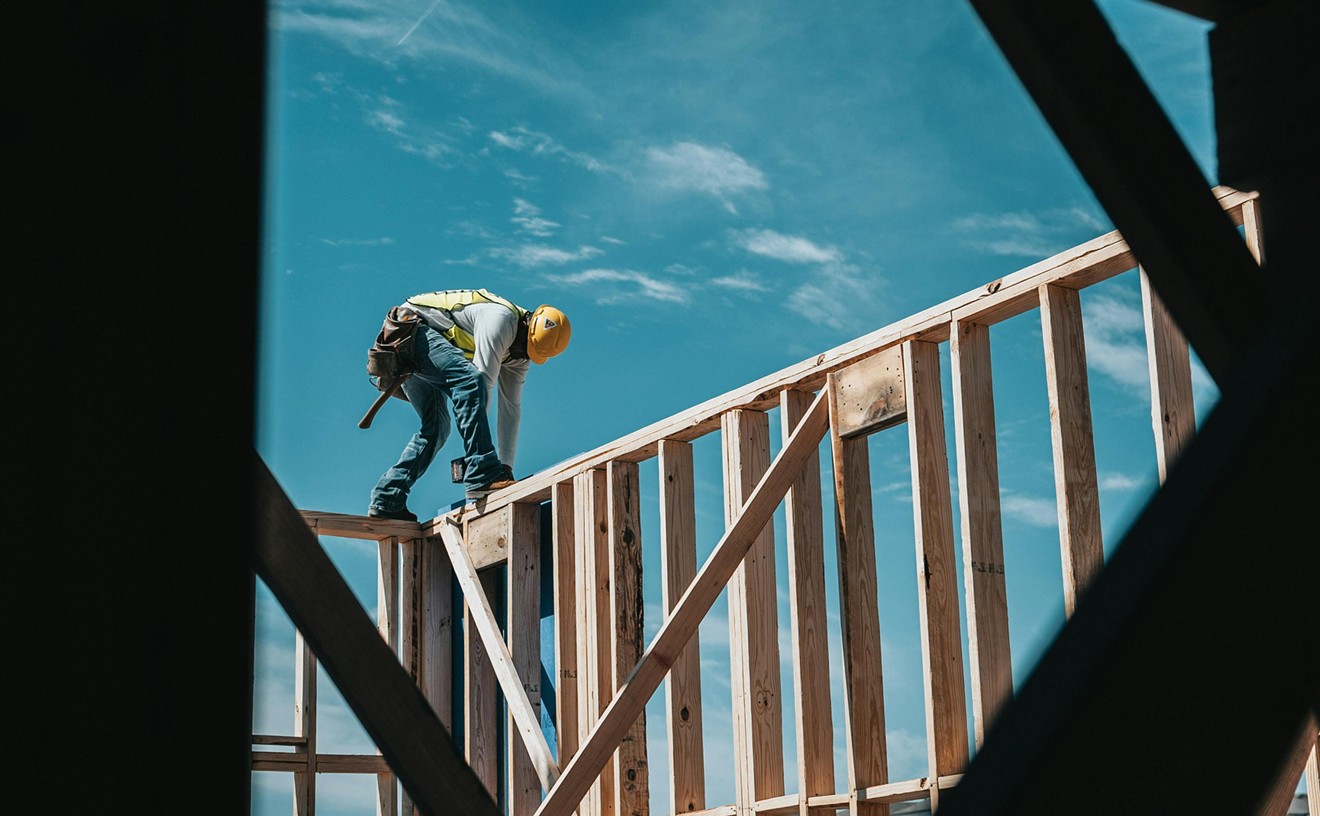May 14, Kiara Yarbrough was sent to Dallas County jail for a probation violation. Seven weeks earlier, the jail was consumed by an outbreak of COVID-19. While a pair of lawsuits have called for the release of medically vulnerable inmates, the jail has avoided responsibility for what attorneys describe as foul conditions and a pattern of negligence. The exact number and causes of death remain unknown, but one attorney closely monitoring the jail says at least three people have died in the jail in the last 45 days.
This is Yarbrough’s story, as told to the Dallas Observer. It has been edited for clarity.
I was worried about the pandemic coming in. When I was booked, my temperature was taken, and I was given a face mask, but I was not tested for coronavirus, and I knew that none of the women around me were either. The nurse that screened me told me that if they suspect someone of having the virus, they’re separated somehow, but he didn’t know how exactly, and with only a temperature reading as a screening, I didn’t have a lot of faith that they’d catch the positive cases. I was sorted into the general population in the North Tower to serve my time.
In early June, a new girl was brought into our 28-woman tank. She was weak, sweaty and vomiting. We thought she might be going through withdrawal symptoms. But early one morning, before everyone was awake, she was taken out. All of her things were removed by guards. We never saw her again. Pretty soon, her cellmate got a terrible headache and started running a fever. She put in a request for medical help and waited to see the nurse. It took two days, but when she finally went off to the nurse, she didn’t come back.
Two days after that, on June 8, the jail doctor came into the tank and told us, “I’m sure you all know that an inmate in here has tested positive for the virus.” We, of course, did not know. Jails lock down information tighter than they lock down inmates. Guards and staff aren’t in the business of telling inmates what is going on. Not knowing anything is one of the worst punishments, and information is more valuable than the commissary in jail. But to be honest, we had started to suspect, because by that time five more of the girls had started to get sick.
“So, since we have a positive test,” the doctor said, “we will be testing all of you today.” And just like that, three nurses in full hazmat gear with gowns, masks, face shields and hair protection came in and tested us all. One nurse held my head steady and another put the swab so far up my nose that I was pretty sure it touched my brain.
They let us know that the results would take a day or two. On June 10, I learned that I had tested positive. So did 19 other women in our 24-person tank. The other four who were negative (or at least had been two days before) were taken out. Since then, almost all of those four have gotten sick.
We were shocked. We knew it was a possibility, but learning that it’s true, that we all have the virus, was terrifying. A lot of the girls cried. A lot of women were angry. A lot of us prayed together. We talked openly about whether we’d die. We were all face-to-face with the fact that it could happen any day now. Surrounded by bars and cinder block walls. Miles away from our families.
My head hurt terribly. My back ached, and bizarrely, a lot of us had pain in our eyes. I felt like someone was pushing on my eyeballs. As much as I hurt, I was always worried that it could get much, much worse. But ultimately, I had a pretty mild case."My head hurt terribly. My back ached, and bizarrely, a lot of us had pain in our eyes. I felt like someone was pushing on my eyeballs. As much as I hurt, I was always worried that it could get much, much worse." - Kiara Yarbrough
tweet this
My friend Lauren was another story. Lauren is only 20 years old. She’s one of the youngest girls in there, so we didn’t think she was going to be vulnerable. But she started to go downhill fast. Lauren’s fever was really high, and the Tylenol the jail gave us (two pills each, twice a day) wasn’t helping. Her chest hurt, especially when she would breathe in. She was weak and she couldn’t eat.
When her fever spiked, I started to worry. I come from a family of nurses. I was a [certified nursing assistant] and worked in home health in better days before I got into trouble. I ran to put wet paper towels around her head and I hit the “picket,” the call button and intercom in the tank, to get the guards’ attention. Guards told me that she would have to wait. There were fights in another part of the jail, and nobody had time at the moment. I did my best to cool Lauren off with water and paper towels until she fell into a fitful sleep. Nobody came to help.
Lauren still had the fever the next day, and she began to cough. By nighttime, the cough became serious. There were points where she couldn’t breathe. I hit the picket again. The guards came over the intercom and said that they’d call the nurse. They sounded unconcerned. Again, nobody came.
Lauren’s fever wasn’t so bad the next day, but the coughing had gotten much much worse. She would cough for 45 seconds at a time without being able to get a breath in. I felt powerless. I wanted to take care of my friend. I wanted to be able to do something. I had never felt so trapped. That evening, in between rubbing her back while she tried to get her breath and futilely hitting the picket (a button I came to believe had been placed in the cell as some kind of dark joke just to give us false hope), Lauren told me that she had begun to pray that God would take care of her mother and her nephew after she died. She gave me her mother’s number and told me to make sure her mother knew how much she cared about her.
When it looked like Lauren would be able to rest, I called her mother. I told her about Lauren’s condition, and that she hadn’t eaten in a week. I told her that she was too weak to even come to the phone to call herself. I told her about the glassy sunken eyes and the prayers and the two Tylenols. I told her everything. “You’ve got to do something,” I told her. “Call someone, call the jail, anyone.” This jail is not a place for a girl to die, I told her, as they sit in a concrete box in clothes that hadn’t been washed or changed for two weeks, in underpants that we wash out with hand soap in a stainless steel sink above the toilet. It’s not right. This couldn’t be the place that Lauren dies.
Evidently, Lauren’s mom called someone. Just as the late shift was starting at about 11 p.m., a guard came in and brought an affidavit form. “Fill this paper out and let these people know that ain’t nothing wrong with you,” the guard said. I was confused. What was she supposed to write? Who was this going to? We couldn’t figure out what to make of it, but whatever it was, it wasn’t help.
I stayed on the picket and Lauren continued to fight for breath until well into the early morning hours. She would cough and struggle so hard it made her throw up bile from her empty stomach. At some point that night, a male nurse came in and took Lauren’s temperature. He didn’t say anything, but gave her some Mucinex. Then he left.
I don’t know if it makes sense, but it was comforting to see someone, even if they weren’t going to do anything. It was nice to know that they knew she was here.
The next day the coughing and retching continued nonstop. Before that, it had been worse at nights, but now it seemed it had become 'round the clock. I looked at the affidavit form the guard had brought in the night before. Lauren couldn’t even hold a pen, so I started filling in the form with the facts of her condition. We talked about what to include and how to say it, with Lauren adding to it as best she could, because she didn’t have much breath to waste on talking. I finished the form and Lauren signed it.
That same day, they took Lauren out to measure her oxygen. It was 84. Then they brought her back into the cell, shut the door and left her there. With Tylenol. And Mucinex. Not oxygen, not a plan to take her to the hospital, not even fluids. Just two Tylenol and a Mucinex. I knew enough at that point to keep my tears to myself. There would be no help, and we could only pray.
In the days that followed, Lauren never got any real medical attention. Miraculously, though, she began to have better days. The panic and gasping for breath would come back, and then would subside a bit. Overall, she was coughing a bit less. She even started to take a few bites of her food, although I suspect it was mostly to make me feel better.
On June 19, they came to get me. I was going home. I know it sounds crazy, but I felt guilty for leaving. I felt guilty for being happy that I got to leave. I made the other girls in the cell swear that they would take care of Lauren. They promised that they would. Lauren promised that she’d get better. And it’s a promise I’m holding her to.
Since I was released, I have done my best to keep in touch. Some of the girls with money on their books have called me with updates, and I have video visited with some of the girls as well. Lauren is still sick, but she was able to make it to the kiosk to prove to me that she’s standing. I am relieved to know that she might just make it through, even though there were long nights that I know we all doubted it.
I know that this virus is serious. Even for me, it was much worse than just a flu, and I had it easy. But I’ve seen it choose people seemingly at random and crush the breath out of their chests. I’ve seen my friend struggle to hold on to life, and I can say that a steel bunk in a cinder block cell is the last place you want to be with this virus.
The jail was not prepared for this. The virus is rampant, and medical care inside the jail is nonexistent. I pray for the women and men who have to face this alone. I suppose if I have just one reason to tell my story, or Lauren’s story, it’s that no matter who we are or what mistakes we have made, we are people, and we matter.











